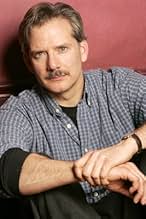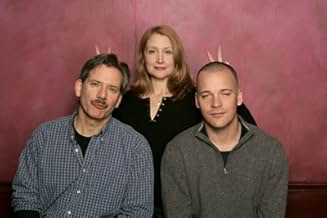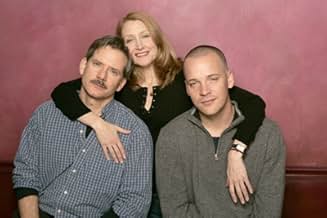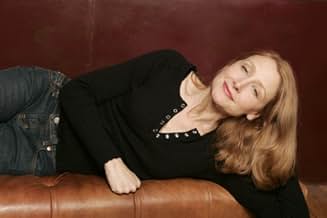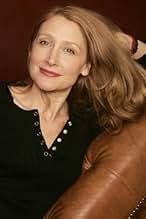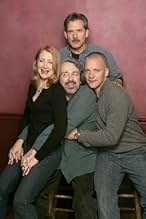IMDb RATING
6.4/10
2.5K
YOUR RATING
A grief-stricken screenwriter unknowingly enters a three-way relationship with a woman and her film executive husband - to chilling results.A grief-stricken screenwriter unknowingly enters a three-way relationship with a woman and her film executive husband - to chilling results.A grief-stricken screenwriter unknowingly enters a three-way relationship with a woman and her film executive husband - to chilling results.
- Awards
- 1 win & 2 nominations total
Craig Hamrick
- Party Guest
- (voice)
- (uncredited)
Jason-Shane Scott
- Robert's Masseuse
- (uncredited)
Bridgetta Tomarchio
- Female Guest
- (uncredited)
- Director
- Writer
- All cast & crew
- Production, box office & more at IMDbPro
Storyline
Did you know
- TriviaThe film is dedicated to writer/director Craig Lucas's best friend, playwright Tony Kushner.
- ConnectionsFeatured in 2006 Glitter Awards (2006)
Featured review
"The Dying Gaul" feels like an updated "Who's Afraid of Virginia Woolf?" set in Hollywood instead of academia. But it gradually veers towards "Fatal Attraction" as the opening jabs at commercial film-making, with lots of name and title dropping that seem to be writer Craig Lucas's revenge on compromises he made for his successful "Prelude to a Kiss," give way to catastrophic psychological manipulation.
The initial Hollywood commentary is emphasized through the settings, as the movie producer, Campbell Scott, and his ex-writer/liberal activist/household and children manager wife, Patricia Clarkson, live in an extraordinary house with a rippling pool and ocean view. Their financial success is wielded like a weapon as the camera restlessly swoops around all their possessions, household help and scenic property. The emotional price he's paid for this is clear as Scott's "Jeffrey" could be in "Glengarry Glen Ross" (to drop film titles like he does) as he'll clearly do anything to seal a deal.
Peter Sarsgaard drives on to the studio lot and into their lives with a completely different character from his four other released films this year, with inflections and body language that only occasionally get a bit too flamboyant as affectations of an out gay writer discussing issues of sexuality in the movies and his late lover. His grief and need for human warmth is so palpable that it is even believable that after failing with psychological counseling and Buddhism to deal with it, he clutches at what used to be called spiritualism, here delivered through the internet, shown visually both in the written word and the actors talking to the camera like reading aloud from their computer screens, edited effectively in the best key scenes with real life.
Clarkson is wonderful as she morphs from busy housewife lounging in a fetching bikini, to curious dabbler in the dark side, to woman scorned and revengeful manipulator. She may be the Ultimate Scary Mother, sexy, maternal and controlling, who while distraught over violent video games goes after the psyche. Unusually for how such a triangle has been portrayed in films (and the film is specifically set in 1995 as perhaps a more innocent time), we also get brief, sympathetic insight on another woman similarly affected by the writer's selfish actions that puts Clarkson's "Elaine" in perspective as she could have been portrayed as more of a brittle harpy. But each character alternately attracts and repels us.
In his directing debut Lucas does not well serve his own script, adapted from his play, as it could have been a lot tauter in exploring the slippery slope of ethics in human relationships, that all it takes is that one small step to deceive or keep secrets before one falls into the well. There could have been a lot fewer arty scenes in silhouette, at sunset, across water.
The Steve Reich music throughout becomes more irritating than tension-inducing.
While the title has something to do with the writer's long monologue about the significance of the Roman sculpture as an artist's way to make victims sympathetic, one is left here more with the feeling that these three folks deserve each other, though the collateral damage left in their wake is a tragedy.
The initial Hollywood commentary is emphasized through the settings, as the movie producer, Campbell Scott, and his ex-writer/liberal activist/household and children manager wife, Patricia Clarkson, live in an extraordinary house with a rippling pool and ocean view. Their financial success is wielded like a weapon as the camera restlessly swoops around all their possessions, household help and scenic property. The emotional price he's paid for this is clear as Scott's "Jeffrey" could be in "Glengarry Glen Ross" (to drop film titles like he does) as he'll clearly do anything to seal a deal.
Peter Sarsgaard drives on to the studio lot and into their lives with a completely different character from his four other released films this year, with inflections and body language that only occasionally get a bit too flamboyant as affectations of an out gay writer discussing issues of sexuality in the movies and his late lover. His grief and need for human warmth is so palpable that it is even believable that after failing with psychological counseling and Buddhism to deal with it, he clutches at what used to be called spiritualism, here delivered through the internet, shown visually both in the written word and the actors talking to the camera like reading aloud from their computer screens, edited effectively in the best key scenes with real life.
Clarkson is wonderful as she morphs from busy housewife lounging in a fetching bikini, to curious dabbler in the dark side, to woman scorned and revengeful manipulator. She may be the Ultimate Scary Mother, sexy, maternal and controlling, who while distraught over violent video games goes after the psyche. Unusually for how such a triangle has been portrayed in films (and the film is specifically set in 1995 as perhaps a more innocent time), we also get brief, sympathetic insight on another woman similarly affected by the writer's selfish actions that puts Clarkson's "Elaine" in perspective as she could have been portrayed as more of a brittle harpy. But each character alternately attracts and repels us.
In his directing debut Lucas does not well serve his own script, adapted from his play, as it could have been a lot tauter in exploring the slippery slope of ethics in human relationships, that all it takes is that one small step to deceive or keep secrets before one falls into the well. There could have been a lot fewer arty scenes in silhouette, at sunset, across water.
The Steve Reich music throughout becomes more irritating than tension-inducing.
While the title has something to do with the writer's long monologue about the significance of the Roman sculpture as an artist's way to make victims sympathetic, one is left here more with the feeling that these three folks deserve each other, though the collateral damage left in their wake is a tragedy.
- How long is The Dying Gaul?Powered by Alexa
Details
- Release date
- Country of origin
- Official site
- Language
- Also known as
- El gal moribund
- Filming locations
- Production companies
- See more company credits at IMDbPro
Box office
- Budget
- $4,000,000 (estimated)
- Gross US & Canada
- $342,747
- Opening weekend US & Canada
- $53,944
- Nov 6, 2005
- Gross worldwide
- $345,041
- Runtime1 hour 32 minutes
- Color
- Sound mix
- Aspect ratio
- 1.85 : 1
Contribute to this page
Suggest an edit or add missing content








